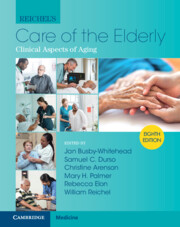Book contents
- Reichel’s Care of the Elderly
- Reichel’s Care of the Elderly
- Copyright page
- In Memoriam
- Contents
- Contributors
- Section I General Approach to the Care of the Elderly
- Section II Geriatric Syndromes
- Section III Care of the Elderly by Organ System
- Chapter 13 Diagnosis and Management of Heart Disease
- Chapter 14 Hypertension
- Chapter 15 Peripheral Artery Disease
- Chapter 16 Neurologic Problems
- Chapter 17 Prevention, Diagnosis, and Management of Stroke
- Chapter 18 Movement Disorders
- Chapter 19 Sleep Disorders
- Chapter 20 Clinical Geropsychiatry
- Chapter 21 Substance Use Disorder
- Chapter 22 Pulmonary Issues
- Chapter 23 Gastrointestinal Disorders
- Chapter 24 Serious Infections
- Chapter 25 Human Immunodeficiency Virus
- Chapter 26 Kidney Disease
- Chapter 27 Urological Conditions
- Chapter 28 Urinary Incontinence
- Chapter 29 Fecal Incontinence
- Chapter 30 Gynecologic Issues
- Chapter 31 Endocrine Disorders
- Chapter 32 Diabetes Mellitus
- Chapter 33 Lipid Management
- Chapter 34 Osteoporosis and Other Metabolic Bone Disorders
- Chapter 35 Common Rheumatologic Disease
- Chapter 36 Geriatric Emergency Medicine
- Chapter 37 Musculoskeletal Injuries
- Chapter 38 Dermatologic Conditions
- Chapter 39 Pressure Injuries
- Chapter 40 Anemia and Other Hematological Problems
- Chapter 41 Cancer
- Chapter 42 Ocular Disorders
- Chapter 43 Geriatric Otolaryngology
- Chapter 44 Oral Health
- Chapter 45 Foot Health
- Section IV Principles of Care for the Elderly
- Index
- Plate Section (PDF Only)
- References
Chapter 14 - Hypertension
from Section III - Care of the Elderly by Organ System
Published online by Cambridge University Press: 30 June 2022
- Reichel’s Care of the Elderly
- Reichel’s Care of the Elderly
- Copyright page
- In Memoriam
- Contents
- Contributors
- Section I General Approach to the Care of the Elderly
- Section II Geriatric Syndromes
- Section III Care of the Elderly by Organ System
- Chapter 13 Diagnosis and Management of Heart Disease
- Chapter 14 Hypertension
- Chapter 15 Peripheral Artery Disease
- Chapter 16 Neurologic Problems
- Chapter 17 Prevention, Diagnosis, and Management of Stroke
- Chapter 18 Movement Disorders
- Chapter 19 Sleep Disorders
- Chapter 20 Clinical Geropsychiatry
- Chapter 21 Substance Use Disorder
- Chapter 22 Pulmonary Issues
- Chapter 23 Gastrointestinal Disorders
- Chapter 24 Serious Infections
- Chapter 25 Human Immunodeficiency Virus
- Chapter 26 Kidney Disease
- Chapter 27 Urological Conditions
- Chapter 28 Urinary Incontinence
- Chapter 29 Fecal Incontinence
- Chapter 30 Gynecologic Issues
- Chapter 31 Endocrine Disorders
- Chapter 32 Diabetes Mellitus
- Chapter 33 Lipid Management
- Chapter 34 Osteoporosis and Other Metabolic Bone Disorders
- Chapter 35 Common Rheumatologic Disease
- Chapter 36 Geriatric Emergency Medicine
- Chapter 37 Musculoskeletal Injuries
- Chapter 38 Dermatologic Conditions
- Chapter 39 Pressure Injuries
- Chapter 40 Anemia and Other Hematological Problems
- Chapter 41 Cancer
- Chapter 42 Ocular Disorders
- Chapter 43 Geriatric Otolaryngology
- Chapter 44 Oral Health
- Chapter 45 Foot Health
- Section IV Principles of Care for the Elderly
- Index
- Plate Section (PDF Only)
- References
Summary
Hypertension is a major public health concern whose prevalence increases with age and is a major risk factor for disability, cognitive decline, cardiovascular events, and death; yet hypertension is frequently undertreated, and sometimes overtreated, in older adults. Evidence from recent clinical trials indicate treating hypertension to targeted blood pressures of < 130/80 is safe and beneficial in ambulatory older adults free of cognitive impairment. However, because clinical trials have tended to exclude persons with cognitive impairment or poor functional status and nursing home residents, management of hypertension in these groups of older adults remains uncertain and the current guidelines recommend using an individualized approach incorporating clinical judgment and patient values. As with management of other chronic conditions, age alone should not be the only consideration to hypertension treatment goals in this heterogeneous population.
Keywords
- Type
- Chapter
- Information
- Reichel's Care of the ElderlyClinical Aspects of Aging, pp. 173 - 179Publisher: Cambridge University PressPrint publication year: 2022



